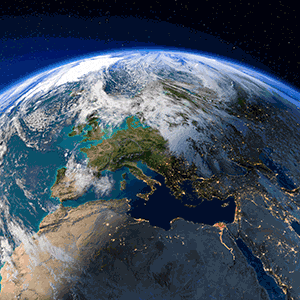“Sport is a growing social and economic phenomenon, which makes an important contribution to the European Union’s strategic objectives of solidarity and prosperity. The Olympic ideal of developing sport to promote peace and understanding among nations and cultures as well as the education of young people was born in Europe and has been fostered by the International Olympic Committee and the European Olympic Committee” .
Alexandre Miguel Mestre, Secretary of State for Sport and Youth, Government of Portugal, and member of the Board of Trustees of Sport and Citizenship - Journal of Olympic History, Volume 18, December 10
Looking back over the shoulder

Ce think tank créé en 2007, réfléchit sur le rôle et la place du sport dans les sociétés européennes. Il publie une revue sur ces questions tous les trois mois.
After all, the memories of Olympia can still be revived today, according to the French philosopher Alain Arvin-Berod. So then, why could not we go back to the roots of Olympism ? That being said, a question remains. How ? “If London 2012 is to be a turning point in Olympic history, listening to the ancient Greek philosophers is not something to be afraid of” . Going back to the roots that is. For that matter, 2012 marks a rather dense year of worldwide sports events : the first Winter Youth Olympic Games were held in Innsbruck, Austria, followed by the Olympic and Paralympic Games in London. The 20th anniversary of the Albertville Olympics will be celebrated, as well as the 120th anniversary of the “Olympic idea” (entitled the Olympic Manifesto, by Baron Pierre de Coubertin). A year prone to memories and remembering.
Replacing the debate from a European perspective
Why a study on the Olympics ? Because it is said to have been a European phenomena from its very beginning that continues to thrive all around the world. “Experience has shown that the EU has known how to take advantage of this context by using Olympism as a tool for the implementation of some of its policies” affirms Mr Miguel Mestre. The reflexion goes further inasmuch as the author claims a “Eurocentrism” approach to the Olympics as largely relevant.
In the article mentioned above, Alexandre Miguel Mestre states comprehensively the many relations between Olympism and the European Union. Transversal topic by excellence, sport, and its universal counterpart - the Olympics - helps us apprehend how the Olympic movement and the European institutions have been closely intertwined over the course of history. Olympism has been used as a pretext, example or tool in the EU’s efforts to promote certain social and educational causes. Also, there has also been a political intervention by the Olympic Movement, in which it sought to make EU institutions aware of the need and interest in resolving matters of common interest, thus instituting a strong “social dialogue” between the two institutions.
“Eurolympism”
Taking into account those arguments and similarities, the conclusion of Mr Mestre is more than legitimate : “The synergies (between Olympism and the EU) are clear. We can therefore conclude that the words of Baron Pierre de Coubertin, when he stated that the Olympic Games are “a system of beliefs and practices” could perfectly have been said by Schuman and Monnet, when they started to plan the construction of the European Union” .
Sport and Citizenship could not miss this rendezvous with History and with Olympia. London 2012 : Perspectives on Sport, Olympism and Society. A special issue of the think tank’s quarterly scientific journal that brings together scientists, thinkers, philosophers and other personalities who carry Olympism and sport in general in their heart. Featuring the most prominent actors of the sport movement and the European institutions, this special edition roots itself in this Euro-Olympic history. Androula Vassiliou (European Commissioner), Sir Philip Craven (President of the International Paralympic Committee), Jacques Rogge (IOC President) and other key personalities successively share their views and hopes about London 2012.
Back to the start
But it seems like we are getting a little bit carried away here. In the prologue of this article, we mentioned history. The IOC has been attached since its very creation to foster peace through sport, via its motto “Create a better world through sport” . Sport, and the Olympics in particular, have moved on from being a time to celebrate health and athletic power of Ancient Greece, to a worldwide tool to promote peace.




 Actualité
Actualité 


 Podcasts
Podcasts  Synthèse
Synthèse  Revue de presse
Revue de presse  Infographies
Infographies  Interviews et débats
Interviews et débats  Questions-Réponses
Questions-Réponses  Topo
Topo